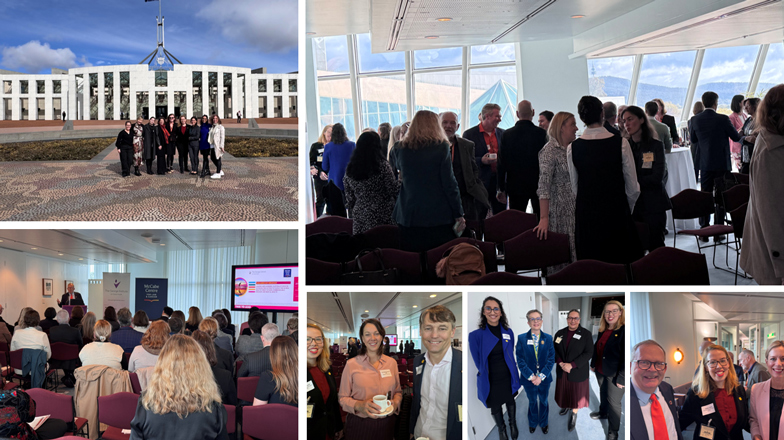
Canberra, Australia – Last week, Parliament House played host to a pivotal event co-hosted by The George Institute for Global Health and the McCabe Centre for Law & Cancer, bringing together leaders across government, health, civil society and academia.
The focus: contributing to the global conversation on non-communicable diseases (NCDs) and mental health ahead of the United Nations High-Level Meeting (UN HLM) on NCDs and mental health in September 2025 - and highlighting opportunities for Australian leadership both locally and globally.
The event featured a keynote address by Dr Cary Adams, CEO of the Union for International Cancer Control (UICC), who spoke powerfully about the need for an ambitious political declaration.
"If we don’t urge for an ambitious Political Declaration on NCDs and mental health, the burden will increase – with more cancers diagnosed at late stages and rising deaths. Inequities within and between countries will only be exacerbated,” said Dr Adams.
“By 2050, we could see 35 million new cancer cases each year, with low- and middle-income countries hardest hit. Behind each case is someone’s child, parent, partner or friend — and every case places a huge burden on families, communities and economies,” he added.
Australia’s leadership role was central to the event discussions, as were the risks of inaction. While we have seen world-leading innovations from Australia on NCDs including on tobacco plain packaging, progress to eliminating cervical cancer, and the introduction of lung cancer screening, inequalities persist within and beyond our shores. With NCDs remaining the most underfunded global health issue - despite being responsible for over 70% of deaths worldwide - speakers underscored the critical need for coordinated, well-resourced, community-led and accountable responses.
Event Highlights
- Aunty Violet Sheridan warmly welcomed attendees to Ngunnawal Country, sharing personal reflections on health, family, and thriving 30 years tobacco-free.
- Professor Anushka Patel, CEO of The George Institute, called for renewed energy and investment in NCDs, urging stakeholders to break down silos, prioritise prevention, and ensure community-driven action.
- Dr Cary Adams (UICC) highlighted the global crisis in health resourcing and reform, warning against complacency and calling for a bold, accountable UN HLM declaration.
- Hayley Jones, Director of the McCabe Centre, emphasised the importance of legal frameworks, WHO “Best Buys” (like health taxes), and strong protections against industry interference.
“This is a pivotal moment. A watered-down declaration will fail to protect lives or advance health equity,” Hayley said.
- Dr Raglan Maddox (ANU) presented evidence on the success of the Tackling Indigenous Smoking initiative, which has helped save over 23,000 lives — demonstrating the power of culturally informed, community-led public health, and the benefit of collaborating with indigenous communities across Oceania.
- Dr Sonia McCarthy from the Department of Foreign Affairs and Trade reaffirmed Australia’s commitment to NCDs and mental health as development priorities, highlighting the importance of cross-sector collaboration and shared global learning.
- Keziah Bennett-Brook (The George Institute) urged for broader, culturally nuanced definitions of health, advocating for data sovereignty, Indigenous leadership, and decolonising health systems.
- Joanna Munro (Health and Wellbeing Queensland) showcased success in embedding Type 2 diabetes prevention within Queensland’s health system through partnerships and innovation.
- Jordie Kilby (The World Bank) shared the organisation’s growing focus on NCD investment through health system strengthening and primary care.
- Professor Bruce Neal (The George Institute) concluded with a call for action grounded in hope, collaboration, and ambition — urging increased engagement, domestic investment, and global solidarity to accelerate progress.
The event underscored that investing in NCD prevention and treatment presents one of the greatest opportunities to save and improve lives by 2030 and beyond.
We were pleased to be joined at the event by a number of Australian politicians, including Assistant Health Minister Rebecca White, Dr Sophie Scamps, Dr Mike Freelander, Dr Monique Ryan and Gabriel Ung.
As momentum builds toward the 2025 UN High-Level Meeting, Australia has a vital role to play in shaping a strong, action-oriented political declaration that drives action and benefits communities across the globe.